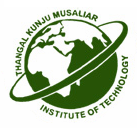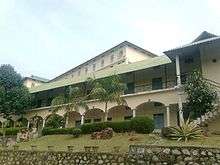TKM Institute of Technology
| Thangal Kunju Musaliar Institute of Technology | |
 | |
| Motto | Inspiring Thought, Imparting Knowledge, Impacting Mindset |
|---|---|
| Type | Private |
| Established | 2002 |
Academic affiliation | Cochin University of Science and Technology, AICTE |
| Chairman | Mr. Shahal H. Musaliar |
| Administrator | Mr. K. Shahir |
Academic staff | 123 |
| Students |
1818 474 |
| Undergraduates | 1616 |
| Postgraduates | 1 |
| Location |
Kollam, India 8°59′42″N 76°41′44″E / 8.99500°N 76.69556°ECoordinates: 8°59′42″N 76°41′44″E / 8.99500°N 76.69556°E |
| Campus | 25 acres (100,000 m2) |
| Website | TKMIT Official Website |
Thangal Kunju Musaliar Institute of Technology ( TKM Institute of Technology) (Malayalam: തങ്ങള് കുഞ്ഞു മുസല്യാര് സാങ്കേതിക വിദ്യാപീഠം) (Hindi:थंगल कुंजू मुसलिअर प्रोद्योगिकी संस्थान) is an institute of engineering and technology located in Karuvelil, Ezhukone, Kollam, Kerala, India. The institute was founded in 2002 as the seventh venture of the Thangal Kunju Musaliar Educational Trust to serve the growing requirement of trained technical manpower in India. TKMIT has been recognized as one of the premier private engineering colleges in Kerala.
Overview
TKM Institute of Technology is affiliated to the Cochin University of Science and Technology and All India Council of Technical Education. The institute is located in a 25-acre campus at Karuvelil, Ezhukone, 23 km from the heart of Kollam city and close to the technology and industrial campus of Technopark, Kollam.
It offers 6 undergraduate programmes and 5 postgraduate programmes under 8 departments. The college has around 100 students and more than 1830 faculty & supporting staff members. Residential facility is available through hostels run by the college for both men and women
History
TKM Institute of Technology was established by the TKM College Trust in the year of 2002 with the approval of the AICTE and affiliation of Cochin University of Science and Technology.
The TKM College Trust was registered as an educational Trust on 20 December 1956, by the Late Thangal Kunju Musaliar, an eminent educationalist and the doyen of the cashew industry. The trust also established well known institutions such as TKM College of Engineering, TKM Institute of Management, TKM College of Arts and Science, other enterprises like Prince-Grand Dual theater complex, Supreme Bakery and several Cashew enterprises. Cashew is the back born of Karuvelil.
In 2002, the college started off with three undergraduate B.Tech courses in engineering: Electronics and Communication Engineering (EC), Computer Science and Engineering (CS) and Information Technology (IT). Undergraduate course in Electronics and Instrumentation (EI) was started in 2006. Two more new generation undergraduate courses in Biomedical Engineering (BM) and Food Technology (FT) were started in 2008. Later-on, Undergraduate course in Electronics and Instrumentation (EI) and Information Technology (IT) was replaced with Mechanical Engineering and Civil Engineering in addition to the introduction of Electrical and Electronics.
First Postgraduate M.Tech course in VLSI & Embedded Systems was started in 2009 under the Department of Electronics and Communication Engineering. In 2010, two more Postgraduate M.Tech courses were introduced by the Department of Computer Science and Engineering in Computer & information Science (CIS) and Software Engineering (SE).In 2011, two more Postgraduate M.Tech courses were introduced by the Department of electronics and communication engineering in Opto Electronics & communication systems and Signal Processing.
Admission
The admission procedure and the fee structure is decided by the Government of Kerala. The details are given in the admission prospectus published by Kerala State Entrance Commissioner under the self-financing colleges category. Admission to 50% of the seats are by the controller of Entrance Examinations, Government of Kerala based on the marks secured at the Common Entrance test. Admission to the remaining seats are done by the college on the basis of:
- Marks obtained by the candidate at the qualifying examination
- Marks obtained by the candidate at the Common Entrance Test conducted by the Controller of Entrance Examinations
- Performance of the candidate at an interview conducted by the institution
However a certain percentage of seats are reserved for the children of Non-Resident Indians (NRIs).
Departments and courses

Departments
- Department of Computer Science and Engineering
- Department of Biomedical Engineering
- Department of Electrical and Electronics Engineering
- Department of Electronics and Communication Engineering
- Department of Electronics and Instrumentation
- Department of Food Technology
- Department of General Engineering
- Department of Humanities and Science
- Department of Mechanical Engineering
- Department of Civil Engineering
- Department of Mathematics
Courses
Undergraduate (Bachelor of Technology)
- Computer Science and Engineering
- Electronics and Biomedical Engineering
- Electrical and Electronics Engineering
- Electronics and Communication Engineering
- Food Technology
- Mechanical Engineering
- Civil Engineering
Postgraduate (Master of Technology)
- Computer & Information Science
- Software Engineering
- VLSI & Embedded Systems
- Opto-electronics
- Digital Signal Processing
Location
The campus is located 23 km from Kollam City and 3 km from Cheerankavu junction on NH 208, the Kollam - Kottarakkara National Highway.
Facilities
The Central Library and knowledge center (CLKC) housed on a two-storied building, which is spread over 35,00sq.ft is divided into following sections:
- Reference
- Technical Journals
- General Stack
- Library Automation
- E-Learning Hut
- IEEE Member's Area
It includes more than 13000 books, 70+ leading national and international periodicals including the IEEE publications, 6 newspapers and 250+ optical discs. The library is open from 9 am to 7 pm on all days except Sundays and public holidays.
The institute has a Central Computing and Browsing Center, which is open on all working days from 10 am to 3 pm. Or whenever a monitoring staff is available. High speed Dial Up connection and 3G , Wi-Max technologies are employed for the web access.
The college runs a well established Health Club & Multi-Gymnasium with modern equipments. Students can make use of this facility during week days and Saturdays from 6 am to 8 am & 5 pm to 8 pm.
A Soft skill training division trains the students in Personality development, Perception and communication, Communication skill development, Enhancing ability, Art of conversation, Public speaking, Presentation skills, Interpersonal relations and conflict resolution methods, Etiquette, Group discussion & interviews.
The institute also runs a canteen inside the campus to serve both vegetarian & non-vegetarian food at nominal rates.
There is also a playground available, for conducting sports and outdoor games and also for annual sports meet.
Hostel facilities are available for both men and women with amenities like TV, telephone, indoor and outdoor games, uninterrupted power and water supply. Each hostel has their own mess facility to provide nutritious food for the students at reasonable rates. A Hostel coordinator takes care of the maintenance of both hostels. Each hostel has a warden, resident deputy warden and resident tutors, who are Professors or Lecturers of the college.
Student activities
The foremost student body of the college is the Senate, which consists of elected representatives from each stream. The college has several students associations, of technical and non-technical nature. Arts festival and sports meet are conducted annually to ensure the mental and physical fitness of students.
Technical associations
These include IEEE student's branch, The Association of Cyber Experts (ACE),Biomedical League for Advancement to Zenith Excellence (BLAZE), Visionaries In Electronic World (VIEW), Soul of Young Revolutionary Info Techz (SYRITZ) and Association of Instrumentation Maestros (AIM), Association of Mechanical Engineers TKMIT(AMET). Various Technical events & Seminars are conducted by each of these associations & different departments to make the students technically sharp.
Non-technical associations and activities
The Training & Placement Cell (TPC), trains the students through mock interview, group discussion and written test. It act as an integral part of the institute's activities for the student. The TPC also ensures that the students fit well into the corporate groove. Campus recruitment commences at the end of the 6th semester and continues until the end of the final semester.
Parent Teacher Association (PTA)
PTA meets frequently to ensure the academic progress of each student in the college.
Alumni Association
The Alumni Association was formed in 2006. The alumni meet annually to share their experience. The executive committee of alumni association are elected after each meeting. This committee is responsible for alumni activities for the coming year.
References
1.http://www.highereducationinindia.com/institutes/tkm-institute-of-technology-32.php - TKMIT
External links
- TKM institute of Technology, Official website
- TKM institute of Technology, Official Alumni website
- TKM institute of Technology, Computer Science Department National Conference website
- Study Guide India
| ||||||||||||||||||||||||||||||||||||||||||||||||||||||||||||||||||||||||||||||||||||||||||||||||||||||||||||||||||||||||||||||||||||||